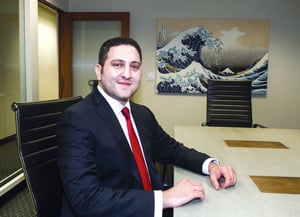Death threats aren’t what they used to be.
In the age of Twitter and Instagram, megacelebrities typically receive such threats via social media rather than in hand-mailed letters written in a collage of magazine cutouts.
Aaron Schoenberger, the 30-year-old founder of L.A. social media surveillance startup Soteria Intelligence, sees these threats – and the challenge of finding them in a sea of millions of other posts – as a business opportunity.
He hopes that celebrities, corporations and billionaires alike will shell out big bucks to have his nascent company detect social-media threats to their well-being before they are imminent.
“We’ve seen interest from venues, convention centers, movie theater chains, sporting complexes and even one of the professional baseball teams,” Schoenberger said. “Professional athletes receive death threats from dropping the ball.”
Schoenberger first got a taste for how often celebrities are threatened when he worked for Dual Star Entertainment Group, Mary-Kate and Ashley Olsen’s marketing company. It was the early aughts, before the days of social media, but he said the twins received some really weird fan mail and were stalked by paparazzi.
Years later, in 2007, he founded L.A. Internet marketing company Brainchild Group, which helped companies manage their reputations by keeping track of what was being said about them online.
Those experiences influenced his idea to launch Soteria, which uses proprietary software to mine Twitter, Instagram, Facebook and other sites to detect potential threats against clients.
It’s not the first company to offer this kind of service, though it is one of the few to offer it exclusively, as such screening is typically offered as an add-on by reputation management, accounting and security firms. But Schoenberger is confident – perhaps more like cocksure – that Soteria’s methods are superior.
Though his company is not yet three months old and has just five clients, he goes so far as to say Soteria could have prevented two New York police officers from being executed last month by Ismaaiyl Brinsley, who posted his intent to kill police officers to Instagram.
The firm’s monitoring, Schoenberger said, “could literally have been the difference between life and death.”
But Parry Aftab, a lawyer specializing in Internet privacy who also sits on Facebook Inc.’s Safety Advisory Board, said that’s a ridiculous claim.
“I see it at Facebook: These threats are posted constantly and no police force could respond to them all,” said Aftab, who is also executive director of New York child advocacy group Wired Safety. “To say that all cops will be safer because of this kind of monitoring is ridiculous.”
Scaling up
Soteria has developed its own monitoring software, but most of the company’s intelligence is human. After a potential threat is detected, it is reviewed by an analyst – one who, unlike Soteria’s algorithms, knows the difference between “it’s the bomb” and “I have a bomb.”
Analysts examine the context of a potential threat then dredge the Internet history of the threat-maker to look for risk factors – a history of posting on gun forums, for instance. If the threat looks serious, the client is contacted immediately and sent information about the threats and the threat-maker.
Threats could include those against individuals or threats to a business, such as a planned criminal flash mob at a mall.
Schoenberger launched Soteria on Oct. 30, and has hired a handful of security and public safety veterans, including board member Ashley Williams, a former U.S. Secret Service agent, and adviser John Gallagher, a former superintendent at the Boston Police Department.
The Soteria team has been working out of offices across Los Angeles, in addition to what Schoenberger calls “command centers” in Calabasas and Los Angeles, where screening is done. The company is currently searching in Beverly Hills for a headquarters office.
With the exception of a few small investors, Schoenberger said he self-funded Soteria, which he has been developing for three years. He expects his investment to pay off quickly because the firm’s rates will be high. For a business executive or celebrity, Soteria’s services will cost from $5,000 to $25,000 a month. For a large multinational corporation, Schoenberger would like to charge $100,000 a month.
But Soteria is not alone in the cybermonitoring business. Aftab said the space is becoming increasingly populated by people who hope to get rich by touting algorithms that aren’t as complex as they claim to be.
“A lot of companies who are doing monitoring came out of brand monitoring, and it’s the same technology – it’s just a glorified Google search,” she said.

